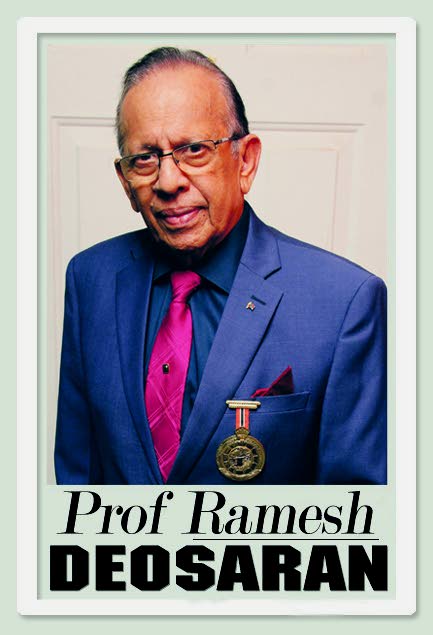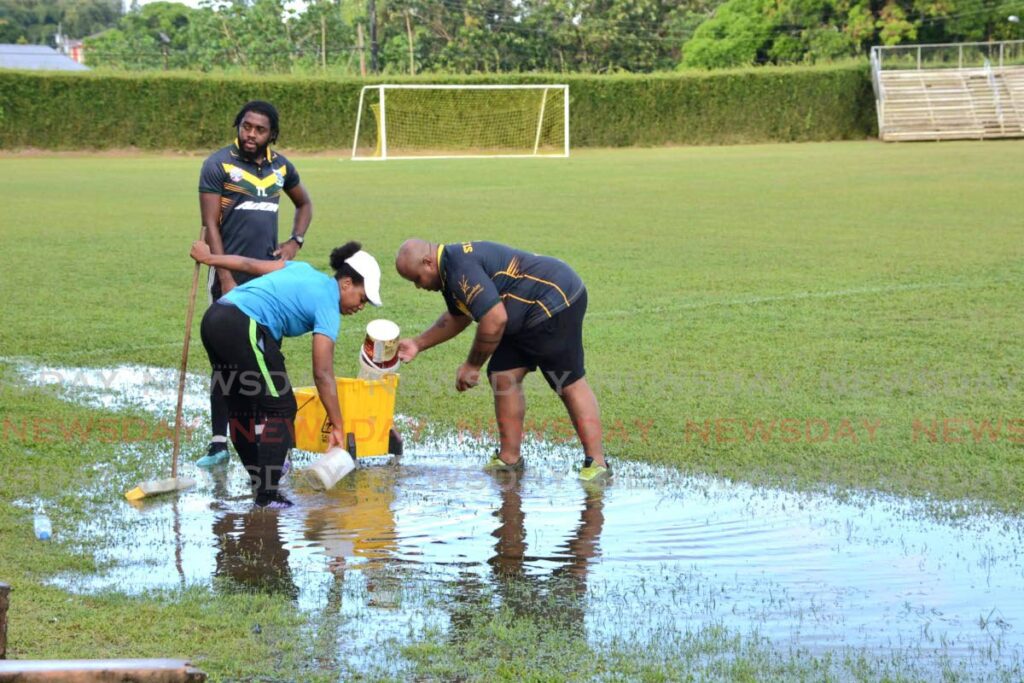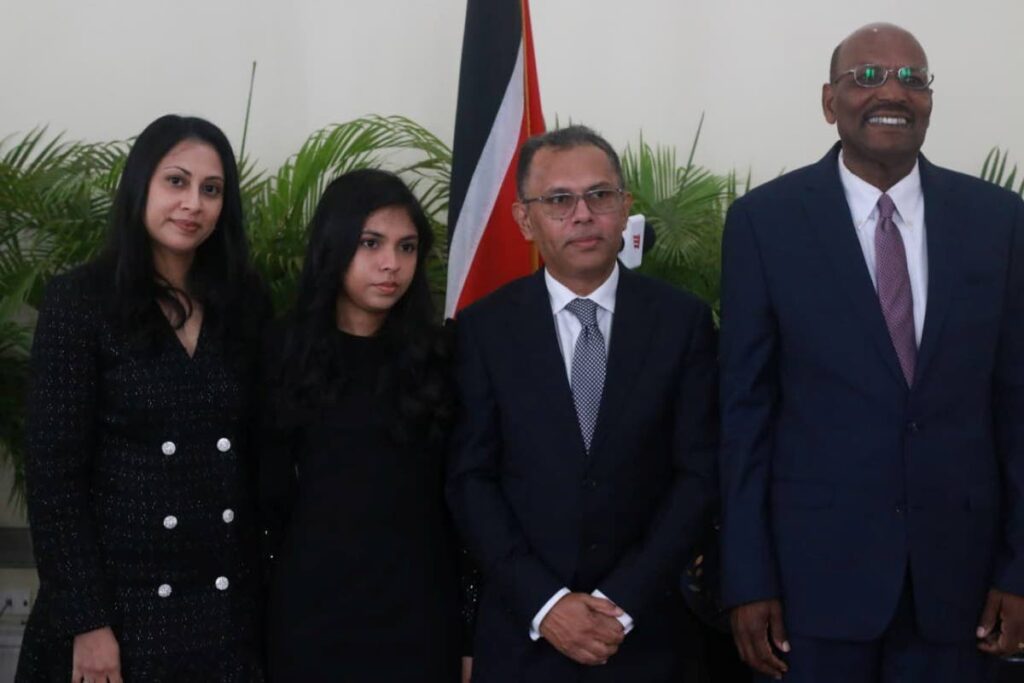Kyna Pedro-Guevara, affectionately known as Kyna, has emerged as a transformative figure in Trinidad and Tobago’s television industry. At 36, her show *Aquí con Kyna*, broadcast on Gayelle the Caribbean, has carved out a unique space for empathy, cultural representation, and human connection. Kyna’s charisma, authenticity, and sensitivity embody the spirit of a modern Caribbean woman—deeply rooted in her heritage yet globally aware.
博客
-

The US in the Caribbean
The guided-missile destroyer USS Gravely is set to dock at the Port of Spain on October 26, marking a significant moment in the escalating tensions between the United States and Venezuela. The vessel, accompanied by the 22nd US Marine Expeditionary Unit, will engage in a four-day joint training exercise with the Trinidad and Tobago Defence Force. This collaboration aims to enhance military preparedness in a region fraught with geopolitical instability.
-

Welcome, CJ, now tackle reforms
Amidst ongoing struggles to address social, political, and economic issues, the UNC government faces yet another high-profile controversy with the rapid appointment of Justice Ronnie Boodoosingh as the new Chief Justice. This follows the unexpected retirement of former Chief Justice Ivor Archie, raising questions about the haste and transparency of the process. Acting President Wade Mark defended the appointment, citing constitutional adherence, while the judiciary lauded Boodoosingh’s distinguished career and commitment to fairness. However, concerns linger over the lack of extensive consultation, particularly with Opposition Leader Pennelope Beckles and substantive President Christine Kangaloo, who is currently on leave. Boodoosingh’s installation speech emphasized hard work, humility, and dedication to public trust, values that resonate deeply in a nation grappling with systemic inefficiencies. His appointment comes at a critical juncture, as the judiciary faces challenges such as case backlogs, ethical reforms, and public accessibility. Boodoosingh’s leadership will be pivotal in driving meaningful judicial reforms, from tightening night courts to addressing systemic injustices. As the dust settles, the focus must shift to restoring public confidence in the judiciary, ensuring it serves not just legal professionals but the broader public interest.
-

Tobago in the 1820s
The island of Tobago, once a possession of the English monarch, faced a series of tumultuous events that shaped its history and socio-economic landscape. One of the most pressing concerns for landowners was the persistent threat of a French takeover, which haunted the island from 1763 and materialized in 1781 and 1802. This fear was finally laid to rest in 1815 with the signing of the Treaty of Paris, which solidified Tobago’s status as a British colony. However, this resolution did not alleviate all challenges, as the island grappled with the growing anti-slavery movement and the declining performance of its sugar industry, a cornerstone of its economy.
In an effort to stabilize the island’s affairs, the administration appointed Charles Alfred Francklyn as the agent for Tobago in 1820. Tasked with overseeing sugar sales, procurement of essential goods, and legal matters, Francklyn’s role was pivotal. Yet, the changing ownership of estates amid the intensifying anti-slavery movement, exemplified by the 1823 rebellion in British Guiana, added to the instability. The plantocracy, burdened by economic realities and unable to sustain their lavish lifestyles, faced further decline.
Another significant development was the construction of a courthouse in 1821, a project overseen by a committee of council and assembly members. This initiative highlighted the island’s efforts to establish a formal legal system. Meanwhile, the allocation of land to poor settlers, including figures like John Burnett and William Sloane Wilson, revealed the complexities of land ownership and social stratification.
The labor of enslaved Africans played a crucial role in Tobago’s economy, not only in estate work but also in defense and other services. However, the compensation for their labor was paid to their owners, not the workers themselves, a practice that underscored the inhumane nature of slavery. After Emancipation, planters claimed a shortage of labor, yet the value of the work done by enslaved Africans far exceeded what they were willing to pay freed individuals.
Despite efforts to address financial deficits through taxation on enslaved individuals, merchants, and alcohol, Tobago’s economy remained unstable. The decline in sugar production and the increasingly volatile atmosphere on plantations mirrored broader regional unrest, leaving the island’s future uncertain.
-

Foster care – is it worth it?
In a recent commentary, Denelle Singh, an attorney at law, highlighted the critical issue of the low rate of applicants for foster care in Trinidad and Tobago. The manager of the Foster Care Unit at the Children’s Authority had previously raised concerns about this alarming trend, pointing out widespread confusion between foster care and adoption. Many potential foster parents are deterred by the lengthy approval process, which spans four to five months, ensuring that applicants are both physically and emotionally prepared for the role. However, the need for foster care is urgent. Children’s homes in TT are often over capacity, leaving many children without a safe and stable environment. These children are often removed from their homes due to neglect, abuse, or socioeconomic challenges, and without foster care, they face an uncertain future. Foster care offers a temporary, family-based solution that provides individualised attention, emotional bonding, and a sense of normalcy, which institutional care often lacks. It also allows time for birth families to address their issues, with the goal of possible reunification. The foster care system not only benefits the children and foster families but also strengthens communities and contributes to national progress. By empowering ordinary citizens to take an active role in child welfare, TT can disrupt cycles of adversity and create a brighter future for its most vulnerable citizens. The Foster Care Unit provides comprehensive support to foster parents, ensuring that children thrive in a nurturing environment. Strengthening the foster care system is not just a moral imperative but a societal one, as it shapes future citizens who can contribute positively to national development.
-

Such Things Exist shines spotlight on3 artists
The exhibition *Such Things Exist*, currently on display at the LOFTT Gallery in Woodbrook, Trinidad, offers a profound departure from traditional Caribbean art. Featuring the works of Bianca Peake, Brian Ashing, and Aurora Honeywell, the exhibition delves into themes of identity, emotion, and personal introspection, challenging conventional expectations of Caribbean aesthetics.
-

Benedict’s go 2nd in SSFL premier division, ‘Naps’ lead cut to one point
The 2205 Secondary Schools Football League (SSFL) premier division witnessed a series of intense matches on October 25, with significant implications for the title race. St Benedict’s College, the reigning Coca-Cola national intercol champions, secured a crucial 1-0 victory over St Anthony’s College at the Mahaica Sporting Complex in Point Fortin. The win propelled them from third to second place in the standings, just one point behind leaders Naparima College. The match was delayed due to a waterlogged pitch, but St Benedict’s made the most of their opportunity with an early goal from Elijah David, reigniting their title aspirations.
Elsewhere, Naparima College, sitting atop the table with 28 points, were held to a surprising 1-1 draw by San Juan North Secondary. Meanwhile, defending champions Fatima College (26 points) slipped to third place after a hard-fought 1-1 draw against Presentation College San Fernando (25 points). The match at Fatima Grounds saw both teams create numerous chances, with Isaiah Jacob of Presentation scoring his 14th goal of the season, while Jonathan Mason equalized for Fatima with a stunning long-range strike.
The results have tightened the race at the top, with the top four teams now separated by just three points. In other matches, Arima North Secondary climbed to seventh place with a 4-2 victory over Trinity College East, thanks to a brace from Darren De Four. The SSFL premier division continues to deliver thrilling encounters as the season approaches its climax.
-

Government brings home over 100 students from Jamaica, 300 stranded in hurricane
As Hurricane Melissa approaches Jamaica, the Trinidad and Tobago government has successfully repatriated over 100 students studying in the region. Prime Minister Kamla Persad-Bissessar announced the evacuation efforts following a meeting of the Standing Finance Committee on October 25. She emphasized that the government has been proactive in ensuring the safety of its citizens abroad. Caribbean Airlines Ltd. (CAL) has been issuing notices on social media, and the TT High Commission in Jamaica has been coordinating with students who wished to return home. However, some students chose to remain, possibly due to delayed communication or personal decisions. The Prime Minister assured that once the hurricane passes, efforts will be made to bring those students home if they still desire to return. The TT High Commission is also ensuring that students have emergency supplies to weather the storm. Despite these measures, a representative from the TT Student Association revealed that nearly 300 students remain stranded at the UWI Mona campus in Jamaica. Many students received evacuation emails too late, and financial constraints prevented others from securing flights. The student representative criticized the government’s response, comparing it unfavorably to the swift actions of other countries like the Bahamas and Antigua and Barbuda, which evacuated their students earlier and provided accommodations. Hurricane Melissa, upgraded to a category one storm on October 25, is expected to intensify significantly before making landfall in Jamaica on October 27.
-

CJ praises teachers who shaped his career
Chief Justice Ronnie Boodoosingh, Trinidad and Tobago’s ninth Chief Justice, was sworn into office on October 22 by acting President Wade Mark, marking a significant milestone in his distinguished legal career. Known for his humility and dedication, Boodoosingh’s journey from his humble beginnings in Sewlal Trace, Pepper Village, and Fyzabad to the highest judicial office in the nation is a testament to the transformative power of education and community support.
-

Four players crack fifties in Red Force Super50 trial match
In an intense trial match at the National Cricket Centre in Couva, Trinidad, the Vikash Mohan XI edged out the Terrance Hinds XI by two wickets, showcasing a thrilling contest ahead of the upcoming CG United Super50 tournament. The match, held on October 24, featured standout performances from several players, including Trinidad and Tobago Red Force batsman Cephas Cooper and National Cricketer of the Year Jason Mohammed. Batting first, the Hinds XI posted a competitive total of 242 in 46.1 overs, thanks to Cooper’s 73 off 84 balls and Mohammed’s 68 off 75. However, their efforts fell short as the Mohan XI chased down the target with 244 for eight in 43.5 overs. Shatrughan Rambaran’s aggressive 66 off 58 and Navin Bidaisee’s composed 54 not out off 76 were pivotal in the victory. Despite losing wickets steadily, Bidaisee and Andrew Rambaran’s 20-run partnership ensured a smooth finish. Earlier, Shaaron Lewis’s three-wicket haul and Mikkel Govia’s two scalps kept the Hinds XI in check. The next trial matches are set for October 26 and 27 at the same venue.
